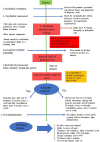Ketamine study: Protocol for naturalistic prospective multicenter study on subcutaneous ketamine infusion in depressed patients with active suicidal ideation
- PMID: 36970275
- PMCID: PMC10033666
- DOI: 10.3389/fpsyt.2023.1147298
Ketamine study: Protocol for naturalistic prospective multicenter study on subcutaneous ketamine infusion in depressed patients with active suicidal ideation
Abstract
Background: Psychiatric disorders are associated with more than 90% of reported suicide attempts worldwide, but few treatments have demonstrated a direct effect in reducing suicide risk. Ketamine, originally an anesthetic, has been shown anti-suicide effects in clinical trials designed to treat depression. However, changes at the biochemical level were assessed only in protocols of ketamine with very limited sample sizes, particularly when the subcutaneous route was considered. In addition, the inflammatory changes associated with ketamine effects and their correlation with response to treatment, dose-effect, and suicide risk warrant further investigation. Therefore, we aimed to assess whether ketamine results in better control of suicidal ideation and/or behavior in patients with depressive episodes and whether ketamine affects psychopathology and inflammatory biomarkers.
Materials and methods: We report here the design of a naturalistic prospective multicenter study protocol of ketamine in depressive episodes carried out at Hospital de Clínicas de Porto Alegre (HCPA) and Hospital Moinhos de Vento (HMV). The study was planned to recruit adult patients with Major depressive disorder (MDD) or Bipolar disorder (BD) types 1 or 2, who are currently in a depressive episode and show symptoms of suicidal ideation and/or behavior according to the Columbia-Suicide Severity Rating Scale (C-SSRS) and have been prescribed ketamine by their assistant psychiatrist. Patients receive ketamine subcutaneously (SC) twice a week for 1 month, but the frequency can be changed or the dose decreased according to the assistant physician's decision. After the last ketamine session, patients are followed-up via telephone once a month for up to 6 months. The data will be analyzed using repeated measures statistics to evaluate the reduction in suicide risk as a primary outcome, as per C-SSRS.
Discussion: We discuss the need for studies with longer follow-ups designed to measure a direct impact on suicide risk and that additional information about the safety and tolerability of ketamine in particular subset of patients such as those with depression and ideation suicide. In line, the mechanism behind the immunomodulatory effects of ketamine is still poorly understood.
Trial registration: https://clinicaltrials.gov/, identifier NCT05249309.
Keywords: bipolar depression; depression; ketamine; suicide; unipolar depression.
Copyright © 2023 Anzolin, Goularte, Pinto, Belmonte-de-Abreu, Cruz, Cordova, Magalhaes, Rosa, Cereser and Kauer-Sant’Anna.
Conflict of interest statement
In the last 5 years, MK-S has received grant or research support from CAPES, CNPq, CNPq-Produtividade FIPE-HCPA and INCT-TM-CNPq; has been a speaker for Daiichi-Sankyo. The remaining authors declare that the research was conducted in the absence of any commercial or financial relationships that could be construed as a potential conflict of interest.
Figures


References
-
- World Health Organization [WHO]. World Report on Violence and Health. Geneva: WHO; (2002).
Associated data
LinkOut - more resources
Full Text Sources
Medical

